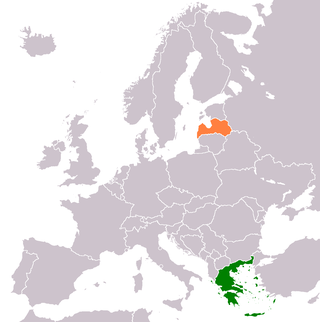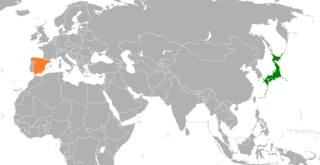 | |
Greece | Japan |
|---|---|
Greco-Japanese relations are foreign relations between Greece and Japan.
 | |
Greece | Japan |
|---|---|
Greco-Japanese relations are foreign relations between Greece and Japan.
Greece and Japan established diplomatic relations in 1899. There has been a Greek Embassy in Tokyo since 1960, and a Japanese Embassy in Athens since the same year, when it was decided to upgrade the Japanese Consulate which had opened in 1922 and reopened in 1956. The consulate closed during World War II (1935–45), Greece joined the Allies, while Japan the Axis.
Since then the two countries have enjoyed good relations in all fields, and cooperate closely. [1]
Relations between the two countries were established with the signing of the Agreement on friendship, trade and navigation. The following bilateral agreements have also been concluded:
1956: Agreement on abolition of visas for non-diplomatic passports.
1973: Aviation Agreement.
1981: Education agreement.
2002: Action plan for the promotion of Greek-Japanese relations. [2]
As far as political cooperation goes, the two countries are working closely together to upgrade their bilateral relations as well as in their response to international crises and in dealing with current issues of international interest. They also cooperate closely and provide reciprocal support in matters of direct national interest, and mutually support each other's candidacies for positions in international organizations. In 1919, Greece supported Japanese racial equality proposal against Great Powers.
In the elections for seats on the UN Security Council, the two countries supported each other's candidacy for positions as non-permanent members of the Council (2005–2006), while during their term on the Council their cooperation in international affairs has become even closer.
The political relations between Greece and Japan are reflected in frequent high-level visits, mainly ministerial visits in the framework of international conferences. In terms of bilateral visits, the then Prime Minister of Greece, Konstantinos Simitis, visited Japan between 3–5 March 2002, accompanied by a delegation of businessmen and journalists, while the Speaker of the Greek Parliament, Mrs. Anna Psarouda-Benaki, visited Tokyo from 29 May to 3 June 2005.
In 1-3.05.03, the Japanese Prime Minister, Junichiro Koizumi, visited Greece for the EU-Japan summit during the Greek Presidency of the EU. On that occasion he held a bilateral meeting with the then Greek Prime Minister Konstantinos Simitis. The Greek Prime Minister Karamanlis paid a working visit to Japan (10-13.11.2005).
The President of the Japanese Parliament, Yōhei Kōno, visited Greece in 9–10 January 2005.
Although there is a substantial volume of trade between the two countries, the balance is disproportionately in Japan's favour, at a ratio of about 1:10. This is because most Japanese exports to Greece are hi-tech and industrial products, while Greek exports are agricultural produce, marble, etc. However, recent years have seen a steady increase in Greek exports, which is indicative of the potential and marked competitiveness of Greek businesses on the Japanese market.
One area in which Greece is particularly dynamic is shipping, with a steadily rising volume of orders and ships being constructed in Japanese yards. It is estimated that these orders are worth 2 billion dollars each year.
Greece is one of the countries where Japanese investment remains low, but Japanese companies have expressed keen interest in cooperation with Greek businesses in the investment sector, while annual exchange visits of business delegations from each side are doing much to promote trade and investment through better understanding of the specific features of the two markets. Within this context Greece had its own pavilion at the 2005 international trade fair in Aichi, Japan.
The number of tourists visiting Greece from Japan has been rising steadily in recent years. About 80,000 Japanese tourists visit the country each year. Even larger numbers are expected in the future, following the huge publicity which Greece enjoyed during the Olympic Year 2004.
In 2000, the Greek-Japanese Chamber of Commerce was established as a non-profit organization, as the successful progress of the Association of Hellenic Japanese Business Co-operation. The Greek-Japanese Chamber is aiming towards promoting mutual economic, commercial and business relations between Greece and Japan.
In 1999 celebratory cultural events were organized on both sides to mark the centenary of the establishment of diplomatic relations between Greece and Japan.
Over recent years in particular there has been intense cultural exchange. Within the context of the Cultural Months envisaged in the Greece-Japan Action Plan in the run-up to the 2004 Olympics, numerous cultural events were organized in both countries, all highly successful, well-attended and extensively covered by the media. To mention a few examples:
In Japan:
In Greece:
The year 2009 marked the 110th anniversary of friendship between the countries. [5] From March to the end of the year, both countries scheduled extensive cultural exhibits celebrating the occasion. [6] [7]
Due to Greece's good relations to Serbia, Japan has used Greece as a bridge to improve relationship with Serbia. [ citation needed ]
In 1922, during the Burning of Smyrna the Japanese freighter Tokei Maru saved many Greek refugees who were trying to escape from the Turks. [8] When the Turkish soldiers surrounded the ship and threaten to sink it, the Japanese captain responded: "If you dare to even touch a hair of any of the refugees, I shall regard it as an affront to the Japanese flag and a threat to the Japanese government." [9]
Lafcadio Hearn was a Greek-Irish-Japanese writer, translator, and teacher who introduced the culture and literature of Japan to the West. [10]
There is a Greek community of roughly 300 people living in Japan. The majority of them are employed by multinational companies, although some are businesspeople who have settled there on a permanent basis.

Greece and Ukraine have deep ties due to Orthodox Christianity and enjoy strong diplomatic relations, due to Greece’s active diplomatic support for Ukraine over the Annexation of Crimea by the Russian Federation. Greece is also one of the main supporters of Ukraine’s entry into the European Union and NATO. Greece recognized Ukraine on December 31, 1991. Both countries established diplomatic relations in 1992. Greece opened an embassy in Kyiv in 1993, general-consulates were set up in Mariupol and Odesa. Ukraine has opened an embassy in Athens and since April 2004 a general-consulate in Thessaloniki. Both countries are full members of the Organization for Security and Co-operation in Europe and of the Organization of the Black Sea Economic Cooperation. There is a large Greek community living in Ukraine. Ukraine was first settled by the Greeks as early as 500 B.C. The Ukrainian city of Odesa was founded by ancient Greek colonists, being also the place where the Filiki Eteria secret organization was founded. Greece is a member of the European Union, which Ukraine applied for in 2022.

Foreign relations exist between Australia and Greece. Relations between the two states are close: the countries were allies during both World Wars and the Korean War. During World War II, Australian forces took part in the Battle of Greece and the Battle of Crete. There is a large Greek community in Australia. Each country has an embassy in the other's capital. Greece also has consulates general in Sydney, Melbourne and Adelaide, as well as a consulate in Perth, honorary consulates general in Brisbane and Darwin, and honorary consulates in Newcastle and Hobart. Both countries are full members of the Organisation for Economic Co-operation and Development.

Greece–India relations, also known as Indo–Greek relations, are the international relations between the Republic of India and the Hellenic Republic. Greece has an embassy in New Delhi and three honorary consulates in Kolkata, Chennai and Mumbai. India has an embassy in Athens and an honorary consulate in Thessaloniki. As of 2023, the relation between the two countries is closer than ever and is considered historical and strategic by both parts.

Greece has an embassy in Berlin and five General Consulates in Hamburg, Munich, Düsseldorf, Stuttgart and Frankfurt. Germany has an embassy in Athens and a General Consulate in Thessaloniki. Germany and Greece are full members of the Organization for Security and Co-operation in Europe, of the Organisation for Economic Co-operation and Development, of NATO, of the European Union, and of the Eurozone.

Greece-Mexico relations are the historical and current bilateral relations between the Hellenic Republic and the United Mexican States. Both nations are members of the Organisation for Economic Co-operation and Development and the United Nations.

Georgian-Japanese relations were established on August 3, 1992, just over one year since Georgia became independent from the Soviet Union. Since November 2006, Georgia has maintained an embassy in Tokyo. Japan has an embassy in Tbilisi.

The Hellenic Republic recognised the Republic of Estonia on May 19, 1922. Greece never recognised the Soviet annexation of Estonia. Both countries re-established diplomatic relations on October 2, 1991. In April 1997, Estonia has established an embassy in Athens. The Greek embassy in Tallinn opened in January 2005. Estonia has also 3 honorary consulates in Patras, Piraeus and Thessaloniki. Both countries are full members of the European Union and NATO.

Greek-Latvian relations are the bilateral relations between Greece and Latvia. Both countries are full members of the Organization for Security and Co-operation in Europe, of NATO and the European Union. The Latvian embassy in Athens was established in 1998. Latvia also has two honorary consulates in Piraeus and in Thessaloniki. The Greek embassy in Riga was opened in January 2005.

Japan–Uruguay relations are foreign relations between Japan and Uruguay. Both countries are members of the United Nations and the World Trade Organization.

Ireland–Japan relations are the bilateral relations between the Republic of Ireland and Japan. Both nations are members of the Organisation for Economic Co-operation and Development.
Athens – Epidaurus Festival is an annual arts festival that takes place in Athens and Epidaurus, from May to October. It is one of the most famous festivals in Greece. The festival includes musical, theatrical and other cultural events.

Denmark–Japan relations are foreign relations between Denmark and Japan. Denmark has an embassy in Tokyo, and Japan has an embassy in Copenhagen. There are 500 Danes who live in Tokyo.

Bangladesh–Germany relations are the bilateral relations between Bangladesh and Germany. Germany maintains an embassy in Dhaka, and Bangladesh has an embassy in Berlin.

Mexico and Sweden are both members of the Organisation for Economic Co-operation and Development and the United Nations.

Mexico–Netherlands relations are the diplomatic relations between Mexico and the Netherlands. Both nations are members of the Organisation for Economic Co-operation and Development and the United Nations.

Japan–Qatar relations are the bilateral relations between Japan and Qatar. Diplomatic relations were established in 1972. The two countries share strong economic ties, with Japan being Qatar's foremost trading partner, and Qatar ranking as Japan's sixth most significant import partner in 2016. Japan has an embassy in Doha. Qatar also has an embassy in Tokyo. In 2023, Japan declared Qatar one of its visa-exempt countries.

Japan–Spain relations are the bilateral relations between Japan and Spain. Both nations are members of the Organisation for Economic Co-operation and Development.

Chile–Japan relations are the diplomatic relations between Chile and Japan. Both nations are members of the Asia-Pacific Economic Cooperation, Comprehensive and Progressive Agreement for Trans-Pacific Partnership, Forum of East Asia–Latin America Cooperation and the Organisation for Economic Co-operation and Development.

Ecuador–Japan relations are the diplomatic relations between Ecuador and Japan. Both nations are members of the Forum of East Asia–Latin America Cooperation.

Cyprus–Mexico relations are the diplomatic relations between the Republic of Cyprus and the United Mexican States. Neither country has a resident ambassador. Both nations are members of the United Nations.